Science indicates that the damage caused by global warming can be significantly reduced, but some of the necessary steps depend on the conduct of each and every one of us. On the occasion of World Environment Day - let's look at what each of us can do - the ball is in our court.
More and more people are concerned about climate change and its negative effects on our lives and on the global ecology, and justifiably so. Many would like to play an active part in finding a solution to the problem, but do not always know how. We meet with countless suggestions as to how to live more sustainably, meeting the needs of the present as well as taking into consideration the needs of future generations, but which steps will be the most significant?
Three Crises
According to a UN special report, three unprecedented environmental crises currently present a risk to the continued existence of the human race and to its quality of life: the climate crisis, pollution, and biodiversity loss. These three crises are intimately interconnected and greatly affect each other, which is why the three need to be addressed simultaneously.
For example, coal combustion pollutes the air with substances that exacerbate all three crises. They are detrimental to health, result in warming of the climate system and lead to the generation of acid rain that damages ecosystems. In contrast, measures that help rehabilitate natural systems increase their ability to absorb carbon dioxide from the atmosphere and by doing so contribute to the halting of the climate crisis. Reducing the climate crisis contributes, in turn, to the rehabilitation of natural systems, and so on and so forth.
Despite the interconnectedness between the solutions, many of them focus mainly on dealing with one of the crises, with a much lesser impact on the others. In order to preserve nature, it is important, for example, to protect as many natural lands and their ecosystems as possible, whereas halting climate change requires first and foremost reduction of the amount of greenhouse gases in the atmosphere. We have chosen herein to focus on the steps required to halt the climate crisis. A similar approach could help in solving the other environmental crises.
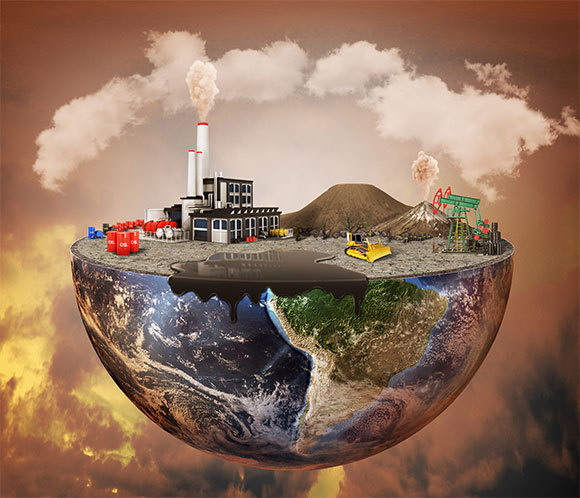
Interrelated crises with reciprocal feedback: Pollution, Climate change and Activity that Impairs Biodiversity | Illustration: studiovin, Shutterstock
Why Do We Pollute?
Human activity in our world produces a high annual amount of greenhouse gases that are emitted into the atmosphere. More precisely, an amount equivalent to about 60 billion tons of carbon dioxide, which translates into an average of 7.5 tons of gas per year, is produced by every person in the world. These gases will warm the Earth for many more years to come, and the main way to keep climate change at bay is to equalize the amount of greenhouse gases emitted to that which is absorbed (fixed) in the soil, in the ocean and in plants, and to do so as quickly as possible.
Carbon dioxide constitutes three quarters of all greenhouse gases emitted by human activities. Most of it ends up in the atmosphere as a result of the burning of fossil fuels such as coal, oil and natural gas for the production of energy, or due to deforestation and destruction of natural habitats, mainly for the purpose of food production. Methane gas, in addition to being the main constituent in the mixture of gases known as “natural gas”, is also the second most important greenhouse gas, its emissions reaching about 18 percent of total global greenhouse gas emissions. Most of the methane is emitted from the intestinal activity of farm animals such as cattle, as well as from gas leaks from drillings in the fossil fuel industry, and from chemical reactions at organic waste disposal sites. That is why it is especially important to address the energy sector as the first priority, the second being agriculture and food production.
We use energy in most areas of life. In industry, electric machinery and brazing furnaces produce the multitude of materials and products we consume; transportation requires fuels that provide energy for cars, airplanes, ships etc; and when we’re at home or in the office, we use energy to power electrical appliances, as well as to heat and to cool our households. To mitigate climate change, humanity must reduce the emissions in all these sectors to a minimum.
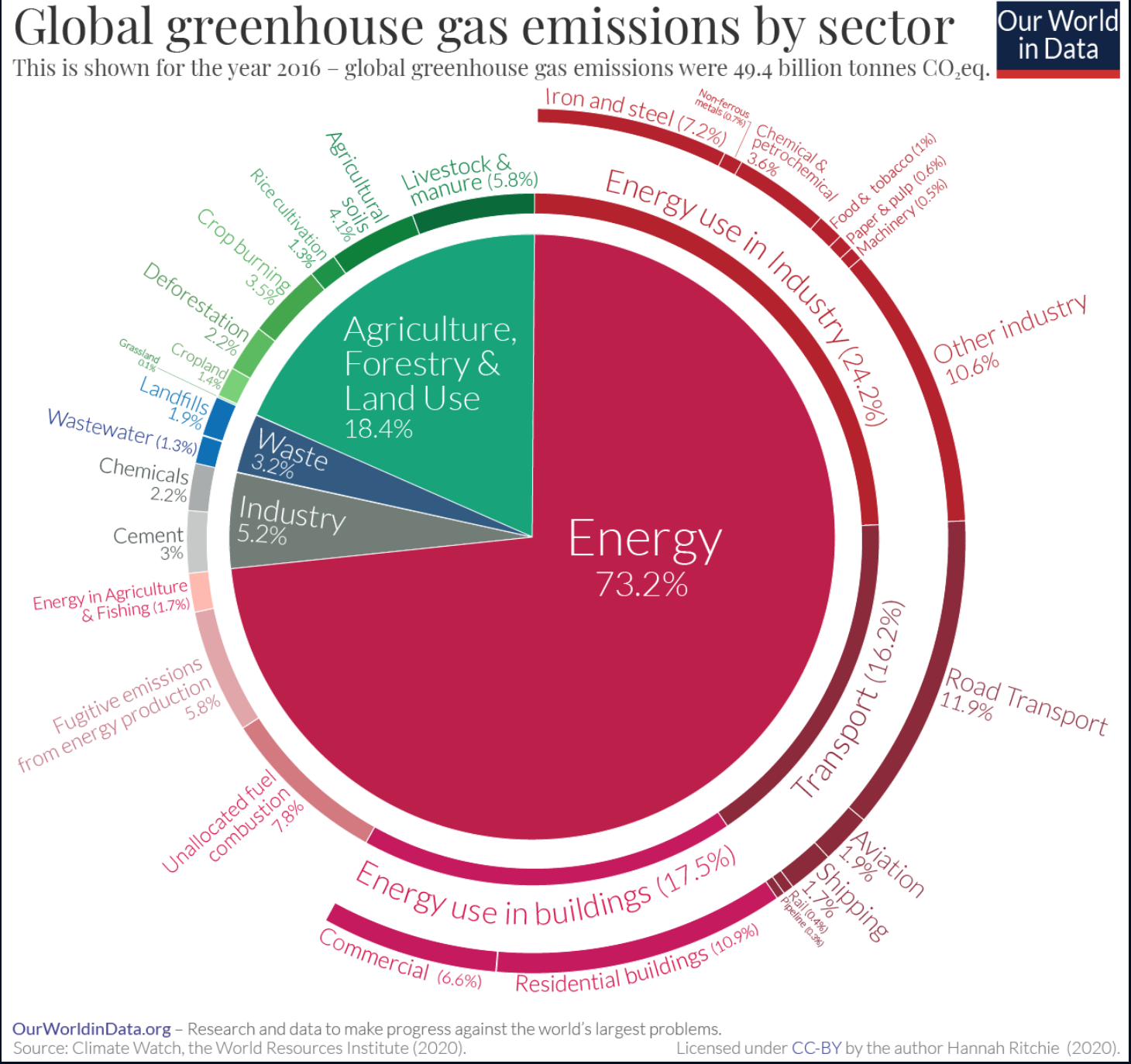
Greenhouse gases are emitted mostly from fossil fuels combustion for energy and from agriculture. Press the image to enlarge | Source: OurWorldinData.org; created by Hannah Ritchie, 2020
Let Your Voice Be Heard
According to the Intergovernmental Panel on Climate Change (IPCC), the most significant steps are those that are under the responsibility of governments and big corporations. These have a crucial influence both on production and usage. Among other things, they can switch from producing electricity by polluting power plants to renewable energy sources such as utilization of sunlight or wind turbines, or build infrastructure that will promote electric public transportation and electric vehicles. It is not surprising then, that public pressure on policy makers was recently found to be the most important means for halting the climate crisis.
The enormous potential of public pressure is evidenced by the profound effect of the events of the First Earth Day. In the 1960s, the public in the United States became aware of the health and environmental consequences of human actions and public pressure for change arose. On April 22nd 1970, about one in ten Americans took to the streets to demonstrate for protection of the environment. As a result, the department of environmental protection (DEA) was established within three years and many unprecedented environmental laws were passed. These laws regulated safety and health protection at the workplace, imposed restrictions on air and water pollution, promoted environmental education, protected endangered species, and regulated the use of pesticides. These were profound changes in all aspects of life that saved the lives of millions of people and countless animals.
In order to reduce the emission of greenhouse gases, countries must invest in legislation, funding and redesign of electric systems, cities, nature reserves, transportation and more. As individuals we can make a difference, if we voice our concerns for the future to policymakers. For instance, we can write to our representatives, committee heads, heads of local authorities, local government officials, and local council members. We can also reach policy makers through social networks and the media.
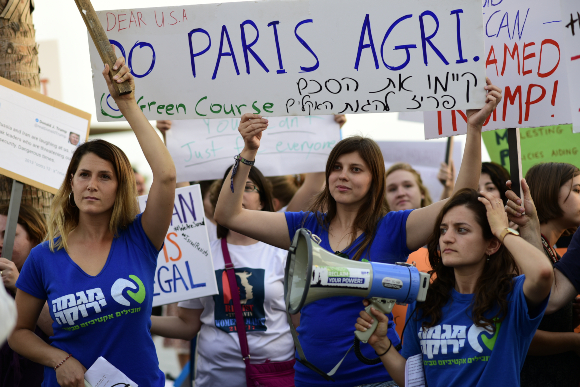
Making a difference by appealing to policymakers. Environmental activists protesting in front of the US embassy in Tel-Aviv in 2017 | Photo: Avivi Aharon, Shutterstock
If we elect representatives who make an emphasis on environmental considerations, and make sure they know that addressing the climate crisis is very high on our list of political considerations and priorities, we can make a difference. In this way, more representatives who support the promotion of the necessary changes will become elected, and more parties will place environmental considerations as a prominent part on their agendas.
Joining social and environmental organizations enables cooperation with other people for promoting the required solutions, and opens the door to more effective ventures and activities. The more we act, and the more we cooperate the more we will achieve. The solutions we promote will also improve our health and quality of life: transitioning to renewable energies will reduce pollution in the air we breathe, improving public transportation will reduce traffic jams, and so on.
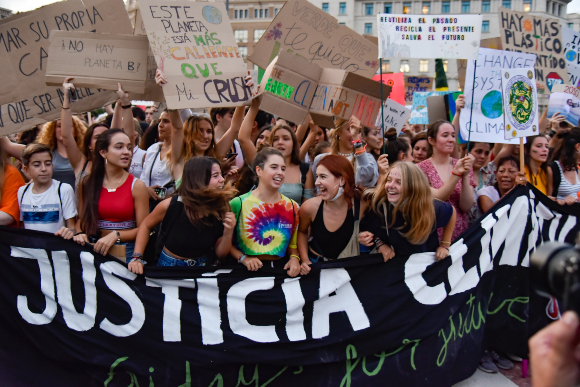
Climate justice. Demonstration in Barcelona, Spain, for the protection of the environment and containment of the climate crisis | Photo: Jossfoto, Shutterstock
Live In the City and Leave The Car In the Parking Lot
According to the IPCC, the most significant change we can make in our lifestyle, which will most prominently reduce emission of greenhouse gases, is to give up the use of private cars and substitute it with walking, riding a bicycle and using public transportation. By doing so we would also improve our fitness and our health as an added bonus. If we cannot completely forgo using the car, we should try and embrace habits that will allow us to use it less.
In order to make it easier to leave the car home, it is preferable to live in the city. Within the city, it is advisable to choose a neighborhood that encourages walking, with pleasant and shaded streets that are connected to each other, lots of people and easy and convenient access to workplaces, attractions, entertainment venues and shops. If you are not planning on moving, take an interest in planning schemes and construction projects in your area and suggest ways to improve them.
In addition, consumer pressure can promote important improvements in public transportation services. The more people use buses and trains, the easier it will be for transportation corporations to improve the frequency and layout of transportation lines, which will in turn enable more people to use public transportation and so on. It is also worthwhile to make our voices heard beyond consumer choice. If I am not satisfied with the availability of public transportation in my area of residence, I can protest about this in front of the customer service of the bus company, and not be satisfied with the pressure on public representatives. Sometimes a simple and polite request is all that is needed in order to lead to a change.
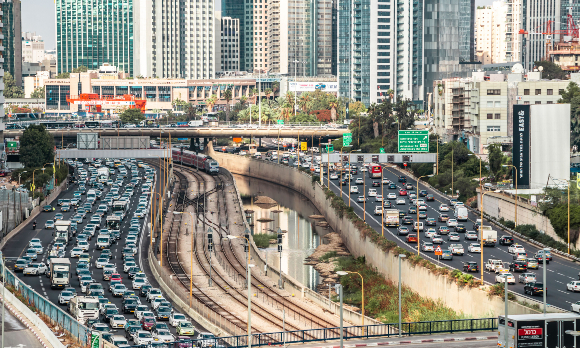
Prefer walking: it’s healthier, less frustrating than traffic jams and most importantly – less polluting. Rush-hour traffic on the Ayalon Highway in Tel-Aviv | Photo: Davidi Vardi, Shutterstock
Fly Less
The amount of greenhouse gases emitted into the atmosphere during a single flight from Tel Aviv to New York, is equivalent to the amount that we would save by becoming a vegetarian for four years, or by giving up the use of a car for a year and a half. We do not currently have efficient aircraft technology that does not come with the high price of significant greenhouse gas emissions . Therefore, it is important to fly as little as possible.
If you are going on a vacation overseas, fly coach and prefer nearby destinations. Due to the wasteful utilization of space on the aircraft, first class flying is responsible for emissions that are on average three times greater compared to the emissions associated with flying in economy class. Likewise, the farther the destination, the more fuel is burned by aircraft, emitting more greenhouse gases. For the same reason, direct flights to the destination should be preferred, while connection flights that increase the flight distance should be avoided. At the country of destination, check whether it could be possible to switch from internal flights to fast train rides, which will usually also save you money.
If you are requested to fly for work, check whether it could be possible to use video conferencing instead of flying, or to combine a few tasks into one efficient work-related trip.

It's best to fly coach to nearby destinations and to avoid non-essential flights. An airliner at sunset | Photo: Sergei25, Shutterstock
Let Your Money Work For You
Even ancient Romans already acknowledged that “money makes the world go round”, and this claim is undoubtedly still valid today. According to the IPCC report, countries are required to increase their monetary investments in the promotion of solutions to the climate crisis sixfold as well as to stop subsidizing the fossil fuel industries. A substantial part of this money comes in fact from private economic entities, and even directly from the public – for example through our retirement pensions.
According to UK laws, an employee above the age of 22 who earns a certain sum of money per year is automatically enrolled in a workplace pension scheme designated for deposits for retirement insurance, with a similar situation being true for many countries. Retirement insurance funds accumulate over the years large sums of money that are invested in a variety of sectors. This implies that every adult employee in such a country de-facto invests money in financial bodies, even if he is unaware of it.
One of the easy actions employees can take is to divert their investments from polluting companies to non-polluting companies. The ranking of pension funds can be one of the considerations while choosing a pension insurance company. Such a ranking should optimally indicate how much of the pension money that the companies are handling is invested in polluting companies, and especially in the fossil fuel industry. The more people incorporate environmental considerations while choosing their pension companies, the more emphasis on such considerations will be placed by investment funds in their choice of investments.
This process is gaining global momentum. There’s a growing recognition that environmental risks are also financial risks that may impact the returns on our savings, and the more apparent this becomes - the more evident will be the economic benefits in adopting a responsible investment policy.
In addition to diverting investments, it is of course possible, at will, to donate directly to organizations that are actively engaging in the fight against the climate crisis.

Our pension funds accumulate large sums of money that could both be used to promote resolution of the climate crisis while maintaining high returns| Photo: TZIDO SUN, Shutterstock
Reduce Beef Consumption
“Food is the single strongest lever to optimize human health and environmental sustainability on Earth”, as stated in a comprehensive report published in the medical journal “The Lancet”. The report was written by 16 scientists and physicians from around the world, to outline ways to feed the increasing world population, improve public health, and reduce the damage caused by the three environmental crises. The food industry is responsible for about one quarter of global greenhouse gas emissions, and is one of the main causes of damage to ecosystems. About half of the world’s habitable area is used for agriculture, combining land used for the growing of crops with pastures used for the grazing of livestock, with the latter comprising most of the global farming land.
According to Walter C. Willett from the Harvard School of Public Health, who was one of the authors of the report, “Transformation to healthy diets by 2050 will require substantial dietary shifts. Global consumption of fruits, vegetables, nuts and legumes will have to double, and consumption of foods such as red meat and sugar will have to be reduced by more than 50%. A diet rich in plant-based foods and with fewer animal source foods confers both improved health and environmental benefits.”
In order to maintain a balanced and healthy diet, it is recommended to adopt new habits slowly and gradually, and stick to them. Only after you have thoroughly implemented a new habit, try to adopt additional new dietary habits. In addition, it is important to beware of overcompensation – a phenomenon in which we tend to eat a double or a triple portion over the weekend if we didn’t have meat on Monday, all the while mistakenly feeling that we are consuming less meat.

Consume Less
Almost every product we purchase comes with an environmental price tag. Therefore, it is important to try and reduce the amount of items we buy, and purchase only what we really need. Adhering to such a policy will also help our wallet and make it easier to keep a tidier home.
In addition, when shopping, it is advisable to prefer getting second-hand items, and strong and durable products that will last the longest. If we have items we don’t need at home, it is recommended to sell or give them away to others, and if a device breaks down, it is best to try to repair it. This will reduce the amount of waste we create. Finally, when buying electrical appliances, it is important to make sure they are energetically efficient. The air conditioner at home and at the office should be adjusted not to be set on too cold temperatures in the summer or on too warm temperatures during the cold season. Moderate air conditioning will substantially reduce power consumption.

Best not to set the air conditioner to excessively cold temperatures. Wise air conditioner usage is more pleasant, more economical and more environmentally friendly | Photo: LightField Studios, Shutterstock
We Matter
Jane Goodall, the renowned chimpanzee researcher who dedicated most of her adult life to environmental protection was quoted saying - “What you do makes a difference, and you have to decide what kind of difference you want to make”.
Humanity is facing one of the greatest challenges it has ever known. Science indicates that we are capable of facing it, and that all parts of society have a role to play in this standoff. Science also shows us which actions are likely to be the most important and effective in reducing global warming and climate change. It is up to us.
